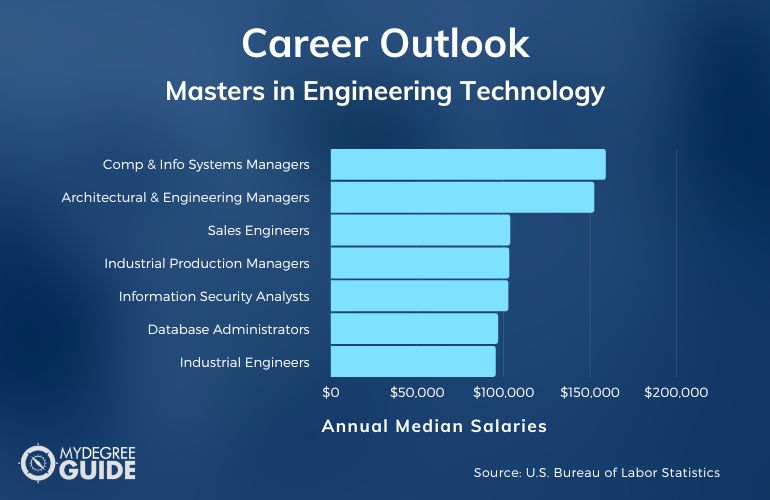If you love breaking things down and discovering what makes them work, you may enjoy pursuing a masters in engineering technology.

Professionals in engineering technology are considered essential in a wide variety of industries, as every company needs to make sure their equipment is working properly. These workers may also help organizations optimize their technology and make cost-effective changes.
Editorial Listing ShortCode:
In these masters programs, students can typically choose a concentration to learn more about an area of engineering technology they are interested in.
Online Masters in Engineering Technology Programs

Masters programs in engineering technology typically focus on real-world applications of students’ engineering and technology skills. They generally help prepare students to apply for hands-on technician roles in the engineering or information technology sectors.
While enrolled in an online masters program in engineering technology, you may study some of the following topics:
- Process improvement
- Cybersecurity
- High-performance building maintenance
- Renewable energy sources
- Vision-based systems
- Programmable logic controllers
- Project management
- Quality control
- Product testing
- Machine learning
Most masters programs want to see that students have completed a bachelors degree, potentially in a specific subject or with a minimum GPA, before admitting them. Some also like to see that students have a few years of work experience under their belt.
Editorial Listing ShortCode:
These graduate programs cover a wide range of topics under engineering and technology umbrellas, including circuit board design, supply chain management, engineering statistics, and more. You may be able to choose a concentration that focuses on an area that you’re interested in.
Masters programs in engineering technology typically offer opportunities for students to participate in capstone projects, research, or internships that can help boost their resume. Engineering technology professionals are typically trained for hands-on roles, such as engineering technician roles.
Post-graduation, students may also apply for engineering roles like an industrial engineer, production engineer, or automotive engineer. A masters may also help you pursue more senior or leadership roles in the field, such as project manager, technical consultant, and manufacturing supervisor.
Graduates may also choose to pursue jobs like database administrator, information systems manager, or logistician.
Common Online Masters in Engineering Technology Concentrations

While you’re in a masters in an engineering technology program, you may be able to choose to focus your studies in an area that interests you most. Examples of engineering technology concentrations are below:
- Computer Engineering Technology. This concentration focuses on teaching students how to analyze, fix, and manage different types of computer networks.
- Mechanics. This specialization dives into manufacturing theories, analysis of different types of structures, and a variety of sustainable energy types.
- Electrical Engineering. You’ll learn more about the foundations and economics of electrical engineering, and you’ll study the specifics of operating electrical technologies.
- Quality Systems and Engineering Management. This concentration covers management concepts, like project management and ethics, along with tools to test system quality.
- Surveying Engineering Technology. This specialization includes courses on geographic information systems, hydrographic surveying, and advanced survey law.
If you have your mind set on a certain specialization, it may be helpful to target your search toward masters programs that offer that concentration.
Engineering Technology Careers & Salaries

After graduating with an M.S. in Engineering Technology, most graduates pursue roles in engineering or in computer and information technology. These roles are generally lucrative, although the exact salary for each role depends on the position, your qualifications, and the employer.
According to the Bureau of Labor Statistics, here are the median salaries of some of the jobs associated with engineering technology.
| Careers | Annual Median Salaries |
| Computer and Information Systems Managers | $159,010 |
| Architectural and Engineering Managers | $152,350 |
| Sales Engineers | $103,710 |
| Industrial Production Managers | $103,150 |
| Information Security Analysts | $102,600 |
| Database Administrators | $96,710 |
| Industrial Engineers | $95,300 |
| Project Management Specialists | $94,500 |
| Operations Research Analysts | $82,360 |
| Logisticians | $77,030 |
In the engineering field, professionals may work as engineering managers, industrial engineers, and engineering technicians.
Editorial Listing ShortCode:
Graduates may also choose to work toward roles like computer systems analyst, database administrator, or logistician. Almost all industries need people in these types of jobs to make sure their systems and databases are working properly and accurately.
Master of Engineering Technology Curriculum & Courses

Your curriculum in an MS in Engineering Technology program may vary, but you’ll likely encounter courses like the following:
- Technology from a Global Perspective: You’ll learn about how technology affects society and can help fix global issues.
- Printed Circuit Board Design: This class teaches you how to construct and troubleshoot printed circuit board designs.
- Facilities Engineering Technology: You’ll learn how to use your engineering skills to improve electrical function in modern buildings.
- Engineering Economics: This course dives into the economic aspect of engineering, covering topics like cost comparison analysis and breakeven value.
- Energy Sustainability and Management: You’ll learn how to incorporate sustainable practices when conducting energy audits of facilities.
- Smart Manufacturing and Global Supply Chain Management: This class teaches students how to create and manage highly effective processes.
- Strategic Project Management: You’ll learn about foundational project management theories and how to apply them in an engineering and technology setting.
- Lean Sigma Implementation: This course teaches six sigma concepts and how to apply them in various companies and organizations.
- Failure Mode and Effects Analysis in Design: You’ll learn how to make a system or process more reliable by studying system failures.
- Applied Engineering Statistics for Industry: This class teaches you about process capability using statistical analysis.
In addition to classes like these, your engineering technology master’s degree may also include opportunities for internships, research, and capstone projects.
Admissions Requirements

The admissions requirements depend on which school and program you’re applying to, but here are a few common ones you may see:
- Bachelor’s degree
- Undergraduate transcripts
- Personal statement
- Letters of recommendation
Most masters programs want to see that you have received your bachelor’s degree, and some may want to check for an undergraduate major in engineering technology or a similar subject. Some schools also want to see a minimum GRE score, but a growing number of schools no longer require standardized test scores for graduate studies.
Accreditation

It’s strategic to attend a regionally accredited school when getting your master’s degree in engineering technology. When a school is regionally accredited, it has met a series of academic quality standards determined by a third-party regional accrediting organization.
Editorial Listing ShortCode:
When it comes time to job search down the line, many employers want to see that you have attended a regionally accredited school. Plus, if you are looking into federal financial aid, you will likely be required to attend an accredited school to qualify. To learn more about accreditation, you can visit the US Department of Education’s website.
Financial Aid and Scholarships

If you plan to look into financial aid resources to help pay for your master’s in engineering tech degree, you might start by exploring the need-based options on the Federal Student Aid website.
The US Department of Education offers a variety of opportunities, such as student loans and work-study programs, that qualifying students can apply for. Graduate students can also look into direct unsubsidized loans, in which your school determines how much money qualifying students can receive. Students don’t need to show financial need to receive these loans, but they are responsible for paying the interest on them.
There are also a variety of scholarship and grant opportunities that you may want to investigate. If you’re currently working, you can see if your employer offers any tuition benefits as well.
What Can You Do with a Masters in Engineering Technology Degree?

Professionals with a master’s in engineering technology degree may qualify for a variety of jobs in the engineering field. Examples of potential career paths in the field include applications engineers, industrial engineers, engineering technicians, business analysts, or logisticians.
Professionals may also work in the information technology sector as computer systems analysts, information security analysts, or database administrators. They may also pursue leadership roles as computer managers, engineering managers, production control managers, or manufacturing supervisors.
How Long Does It Take to Get a Masters in Engineering Technology Online?

Many full-time graduate students complete their programs in 1 to 2 years. The timeframe for completing a masters in engineering technology degree online depends on a few different factors. These can include your program’s schedule, your enrollment status, and your program’s thesis requirement.
If you attend a 36-credit hour program, you may be able to complete it in 1 year if you take classes full-time, including during the summer, and don’t need to complete a thesis. If you attend classes part-time, take summers off from school, or need to complete a thesis, you may take longer to graduate.
What’s the Difference Between an Engineering vs. Engineering Technology Masters Degree?
There is a lot of overlap between engineering and engineering technology masters programs, but here are a few key differences.
- Master’s in Engineering: In general, masters programs in engineering are more theoretical and study advanced math and science. This type of program may cover topics like advanced physics, advanced calculus, and digital logic design.
- Master’s in Engineering Technology: Masters programs in engineering technology help prepare students to practically create and optimize devices. This field is more hands-on. This program may delve into subjects like the Internet of things (IoT), cloud computing, and operations systems.
The field of study that’s right for you will depend on your interests and career goals.
Is a Master in Engineering Technology Degree Worth It?

Yes, a master in engineering technology degree is worth it for many students. Whether you want to advance your current career or enter the engineering technology field for the first time, earning a masters degree could help you expand your skill set and grow your job opportunities.
Editorial Listing ShortCode:
Engineering and information technology roles tend to be lucrative, and the Bureau of Labor Statistics projects that architecture and engineering occupations overall will see 4% job growth over the next ten years. This steady growth is as fast as the average for all occupations. Some related roles, such as industrial engineers and logisticians, are expected to grow much faster than average over the same period.
Universities Offering Online Masters in Engineering Technology Degree Programs
Methodology: The following school list is in alphabetical order. To be included, a college or university must be regionally accredited and offer degree programs online or in a hybrid format.

Capitol Technology University offers an MS in Engineering Technology that can be completed fully online. The program is intended for students who already have a bachelor’s in engineering or a related field. The program requires the completion of 30 credits, including project-based and research-based capstone experiences.
Potential courses include Designing for Testability, Impact of Emerging Technology on Management and Public Administration, and Technology Enabled Operations.
Capitol Technology University is accredited by the Middle States Commission on Higher Education.

Drexel University offers an MS in Engineering Technology that can be completed entirely online. Courses are offered in quarter semesters with start dates in the fall, winter, spring, and summer. Most classes are 10 weeks long. The program requires the completion of 45 quarter credits, or 30 credit hours.
Drexel University is accredited by the Middle States Commission on Higher Education.

Mississippi State University offers an MS in Agriculture with a concentration in Engineering Technology. The program is fully online and doesn’t require a thesis. The program requires the completion of at least 30 credit hours, half of which must be at the 8000-level. Classes follow a regular semester schedule with options in the fall, spring, and summer.
Mississippi State University is accredited by the Southern Association of Colleges and Schools Commission on Colleges.

U.S. News & World Report named Purdue University as one of the best colleges in the country for online engineering programs. An MS in Engineering Technology can be earned through the school’s fully online program. Applicants are required to have three years of professional experience. Courses follow a regular semester schedule, and most content is asynchronous.
Purdue University is accredited by the Higher Learning Commission.

The University of Maine offers a fully online program for an MS in Engineering Technology with concentrations in Surveying Engineering Technology and Electrical Engineering Technology. Courses follow a semester schedule with start dates in the fall, spring, and summer. The program requires the completion of 30 credits, including field and project management experiences.
The University of Maine is accredited by the New England Commission of Higher Education.
Getting Your Masters in Engineering Technology Degree Online

If you love problem-solving and want to grow your professional qualifications in engineering technology, you might consider pursuing a masters degree in engineering technology online.
These engineering degree online programs are highly technical and specialized, and they offer courses that teach advanced knowledge about various systems and technologies. You may also have the opportunity to apply your skills through capstone projects, research, and internships. These masters degrees may help open doors to a wide variety of technician roles and leadership roles within engineering and computer science.
If you’re ready to take the next step in your professional journey, you could start exploring accredited engineering technology masters programs today.

